|
|
|
Sort Order |
|
|
|
Items / Page
|
|
|
|
|
|
|
| Srl | Item |
| 1 |
ID:
116497
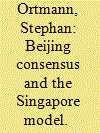

|
|
|
|
|
| Publication |
2012.
|
| Summary/Abstract |
What is today touted as the 'Beijing consensus' or the 'China model' is nothing more than a resized version of the 'Singapore model' or an attempt to revive the developmental state. In particular, the 'Beijing consensus' assumes a greater role for the state in the economy under authoritarian rule. Since Deng Xiaoping's Southern Tour in 1992, Chinese academics, politicians, and administrators have flocked to the soft-authoritarian city-state and the result has not only been a sprawling discourse but also a number of political reforms aimed at increasing the effectiveness of the state and strengthening one-party rule. An analysis of this discourse shows that while providing Chinese policy-makers with many important ideas, these studies reveal serious weaknesses in China's attempt to follow the 'Singapore model'. Instead of having found an alternative authoritarian state-capitalist model, the 'Beijing consensus' is only a transitory phase.
|
|
|
|
|
|
|
|
|
|
|
|
|
|
|
|
| 2 |
ID:
167065
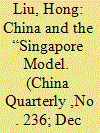

|
|
|
|
|
| Summary/Abstract |
Over the past three decades, China has shown tremendous interest in the “Singapore model” through its sending of tens of thousands of cadres to Singapore for executive training and graduate education. Although this phenomenon has been studied, no attention has been drawn to the perspectives of those mid-level cadres who took part in the training and what those perspectives might imply. Utilizing a unique dataset of over 1,350 mid-level cadres graduating from the “Mayors’ Class” in Singapore from 1995 to 2016 and follow-up surveys and interviews, this article intends to fill this gap. We found that the most appealing characteristics of the “Singapore model” for these mid-level officials lay in practical governance lessons and their potential transferability rather than in ideologies. This finding challenges conventional wisdom that the most plausible rationale of China's learning from Singapore is political. We also examine Xi Jinping's view of Singapore and its relevance to China's latest national agendas in building a “learning nation” and strengthening the CCP's resilience through anti-corruption and intra-party regeneration. The conclusion places the China–Singapore case within the context of the changing trend of transnational knowledge transfer in the non-Western world.
|
|
|
|
|
|
|
|
|
|
|
|
|
|
|
|
| 3 |
ID:
131355
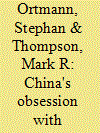

|
|
|
|
|
| Publication |
2014.
|
| Summary/Abstract |
Chinese government officials and academics have shown disproportionate interest in the small city-state of Singapore. The Southeast Asian country with a majority ethnic Chinese population has drawn their attention because it is the only country in the world that combines advanced industrial development with stable one-party rule. Singapore not only seemingly defies Western predictions that modernization will inevitably lead to democracy, but also appears to show that authoritarian regimes may be better suited to achieving societal stability in an Asian context. In particular, the ruling party of the city-state, the People's Action Party, has drawn the attention of conservative Chinese reformists who seek to fill the ideological void that emerged following the decline of Maoist ideology. Reformers in China also derive practical governance lessons from Singapore about fighting corruption, increasing professionalization, and improving responsiveness within the party-state. As such, political learning from the Singapore model must be seen as part of the ongoing process of transformation of the Chinese Communist Party. As a consequence of this learning process, Chinese reformers are using lessons from the Singaporean model as arguments in their efforts to bolster the ideological foundations and strengthen the governance capacity of one-party rule, thus reducing pressures for democratization.
|
|
|
|
|
|
|
|
|
|
|
|
|
|
|
|
| 4 |
ID:
167063
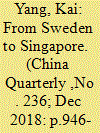

|
|
|
|
|
| Summary/Abstract |
China can be described as a “learning state” which has adapted to changing conditions and frequently turned outward for lessons. In recent years, Sweden and Singapore have drawn particularly strong interest from Chinese academics because the two countries represent two different “third ways” between Communism and capitalism and have been useful for developing a socialism “with Chinese characteristics.” Sweden is seen to symbolize the ideals of social equity and harmony while Singapore is seen as a model of authoritarian state-capitalism. China's transformation has resembled the Southeast Asia city state's model more than the Scandinavian social democratic model. Since Xi Jinping assumed power in 2012, interest in Sweden has reached a nadir, while attentiveness to Singapore has peaked. Although Chinese state-capitalism faces many challenges, including rising inequality and persistent corruption, it will be difficult to find an alternative role model that can successfully combine one-party rule with economic modernization.
|
|
|
|
|
|
|
|
|
|
|
|
|
|
|
|
| 5 |
ID:
167062
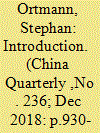

|
|
|
|
|
| Summary/Abstract |
This special section deals with China's longstanding fascination with Singapore's development experience that has preoccupied post-Maoist leaders from Deng Xiaoping to Xi Jinping despite the obvious differences between the tiny Southeast Asian city-state and the most populous country on earth. In particular, there is great Chinese interest in Singapore's success in combining effective governance and efficient state capitalism with stable one-party dominant rule. As a consequence, Chinese observers paid much less attention to electoral democracies that were well-governed states with mature economies.
|
|
|
|
|
|
|
|
|
|
|
|
|
|
|
|
| 6 |
ID:
167067


|
|
|
|
|
| Summary/Abstract |
Singapore exemplifies what China strives for: resilient authoritarianism despite advanced development with good governance and political stability. But lessons Chinese observers draw from the Southeast Asian city-state have been selective, leading to misconceptions. We focus on three key areas in which Chinese observers claim inspiration from the “Singapore model.” The first, Singapore's “Asian values” discourse which is seen to provide an ideological defense of non-democratic rule, overestimates the impact of top-down conservative culturalism while underestimating the difficulty of propagating Confucianism in officially still communist China. Second, while elections in Singapore are seen to bolster the ruling People Action Party's legitimacy in Singapore, they have been implemented to such a limited extent in China that any legitimation gain is unlikely. Finally, the chief lesson derived from Singapore's fight against corruption, the importance of a committed leadership, ignores the importance of the rule of law in Singapore, a legacy of colonialism very different from China's post-totalitarian trajectory.
|
|
|
|
|
|
|
|
|
|
|
|
|
|
|
|
|
|
|
|
|